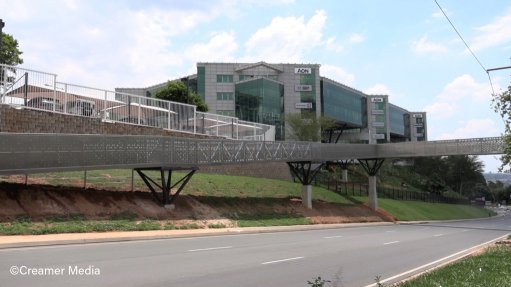Growing Africa’s Industrial Corridors: Seizing the Manufacturing Opportunity
This article has been supplied.
Africa is emerging as a global hub for manufacturing, with the continent’s industrial corridors providing unprecedented opportunities for investment and economic growth. As governments prioritise industrialisation and the creation of sustainable supply chains, Africa’s manufacturing sector is poised to become a driving force in the continent’s economic transformation.
To further explore these opportunities, the upcoming Manufacturing Indaba will bring together industry leaders, policymakers, and investors to discuss Africa's manufacturing potential. This key event, taking place from the 22 – 23 October 2024 in Johannesburg, South Africa, will provide insights into new developments in industrial corridors, investment strategies, and regional trade integration.
Unlocking Africa’s Manufacturing Potential
Africa’s industrialisation efforts are gaining momentum, fuelled by a combination of strategic investments, favourable government policies, and the expansion of the African Continental
Free Trade Area (AfCFTA). The manufacturing sector is increasingly seen as a key to addressing Africa’s economic diversification needs, reducing dependence on raw materials and commodities, and positioning the continent as a global production center.
Ethiopia, South Africa, Morocco, and Nigeria are leading the charge, developing industrial parks, special economic zones (SEZs), and export processing zones (EPZs) to attract foreign direct investment (FDI) and foster local entrepreneurship. These industrial hubs, or industrial corridors, are transforming Africa’s economic landscape by providing the infrastructure, logistics, and regulatory frameworks necessary to support large-scale manufacturing.
Key Sectors Driving Growth
1. Automotive Manufacturing
Africa’s automotive industry is one of the fastest-growing sectors, with major investments from global automotive brands. South Africa remains the continent’s leading automotive manufacturing hub, with assembly plants for global automakers. Morocco and Egypt are also attracting significant automotive investments due to their strategic locations and favourable trade agreements.
2. Textiles and Apparel
Africa’s textile and apparel sector is experiencing rapid growth, driven by the continent’s young workforce, competitive labour costs, and increasing demand for "Made in Africa" products. Countries like Ethiopia, Kenya, and Mauritius are becoming regional leaders in textile production, exporting to Europe, the U.S., and Asia.
3. Pharmaceuticals and Healthcare
The pharmaceutical manufacturing industry in Africa is expanding as the continent seeks to strengthen its healthcare systems and reduce dependency on imported drugs. Countries like South Africa, Ghana, and Nigeria are investing in local pharmaceutical production to meet the rising demand for healthcare products.
4. Consumer Goods and Electronics
The demand for consumer goods, electronics, and home appliances is growing, fuelled by Africa’s rising middle class and urbanisation. Local and international manufacturers are tapping into this demand by setting up production facilities in countries such as Egypt, Nigeria, and Rwanda.
Infrastructure and Connectivity: Enabling Industrial Growth
Africa’s industrial corridors are supported by significant investments in transportation, logistics, and energy infrastructure. Major projects like the LAPSSET Corridor (Linking Kenya, Ethiopia, and South Sudan), the North-South Corridor (spanning South Africa, Botswana, Zimbabwe, Zambia, and the DRC), and the West African Growth Corridor are critical to connecting manufacturing hubs with regional and global markets.
In addition, investments in energy are crucial for supporting the continent’s manufacturing ambitions. Reliable power is key to ensuring that industries can operate efficiently and competitively. Countries like South Africa and Kenya are making strides in renewable energy, reducing energy costs for industries and boosting their global competitiveness.
The Role of the African Continental Free Trade Area (AfCFTA)
The AfCFTA, the world’s largest free trade area by number of countries, is expected to be a game-changer for Africa’s manufacturing sector. By creating a single market for over 1.3 billion people across 55 countries, the AfCFTA will facilitate intra-African trade, reduce tariffs, and promote regional supply chains. This will allow African manufacturers to scale up production, access new markets, and compete more effectively on the global stage.
Challenges and Solutions
While the opportunities are vast, Africa’s manufacturing sector faces several challenges, including infrastructure deficits, skills gaps, and regulatory hurdles. However, public-private partnerships (PPPs) and international development financing are helping address these issues by supporting infrastructure development, vocational training, and regulatory reforms that promote business-friendly environments.
Conclusion: Africa’s Manufacturing Revolution
The growth of Africa’s industrial corridors signals the dawn of a new era for the continent’s manufacturing sector. With a strategic focus on infrastructure, trade integration, and industrial policy, Africa is well-positioned to become a global manufacturing hub. For investors, this represents an unparalleled opportunity to participate in the continent’s industrial transformation, tapping into its vast markets and resources.
Article Enquiry
Email Article
Save Article
Feedback
To advertise email advertising@creamermedia.co.za or click here
Comments
Press Office
Announcements
What's On
Subscribe to improve your user experience...
Option 1 (equivalent of R125 a month):
Receive a weekly copy of Creamer Media's Engineering News & Mining Weekly magazine
(print copy for those in South Africa and e-magazine for those outside of South Africa)
Receive daily email newsletters
Access to full search results
Access archive of magazine back copies
Access to Projects in Progress
Access to ONE Research Report of your choice in PDF format
Option 2 (equivalent of R375 a month):
All benefits from Option 1
PLUS
Access to Creamer Media's Research Channel Africa for ALL Research Reports, in PDF format, on various industrial and mining sectors
including Electricity; Water; Energy Transition; Hydrogen; Roads, Rail and Ports; Coal; Gold; Platinum; Battery Metals; etc.
Already a subscriber?
Forgotten your password?
Receive weekly copy of Creamer Media's Engineering News & Mining Weekly magazine (print copy for those in South Africa and e-magazine for those outside of South Africa)
➕
Recieve daily email newsletters
➕
Access to full search results
➕
Access archive of magazine back copies
➕
Access to Projects in Progress
➕
Access to ONE Research Report of your choice in PDF format
RESEARCH CHANNEL AFRICA
R4500 (equivalent of R375 a month)
SUBSCRIBEAll benefits from Option 1
➕
Access to Creamer Media's Research Channel Africa for ALL Research Reports on various industrial and mining sectors, in PDF format, including on:
Electricity
➕
Water
➕
Energy Transition
➕
Hydrogen
➕
Roads, Rail and Ports
➕
Coal
➕
Gold
➕
Platinum
➕
Battery Metals
➕
etc.
Receive all benefits from Option 1 or Option 2 delivered to numerous people at your company
➕
Multiple User names and Passwords for simultaneous log-ins
➕
Intranet integration access to all in your organisation














